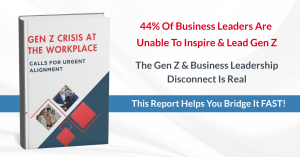Australia's Gen Z Workforce Is Disillusioned, Not Just Disengaged: Engaged Strategy's New Study Sounds The Alarm
With less than half of Australia's business leaders confident about engaging Gen Z staff, this new study reveals critical disconnects and offers a way forward.
The emotional and cognitive engagement needs of the Gen Z workforce are deeply strategic. Ignoring them won’t just hurt retention of talent, but will also stifle innovation and culture.”
AUSTRALIA, July 24, 2025 /EINPresswire.com/ -- — Christopher Roberts
- 52% of Australian business leaders believe their Gen Z staff are disengaged
- 60% of business leaders say they do not find it easy to inspire and lead Gen Z
- 56% of Gen Z women say they do not feel encouraged to have an open dialogue, while 54% say they do not have the support to maintain a healthy work-life balance
- 50% Gen Z men say their leaders do not discuss or provide clear pathways
Australia’s industrious workplace culture is facing an invisible crisis. A groundbreaking new study by Engaged Strategy, "Gen Z Crisis at the Workplace Calls for Urgent Alignment", reveals a troubling disconnect between Gen Z employees and their business leaders. As Gen Z increasingly dominates the global workforce, Australian leaders are struggling to connect with this purpose-led generation.
The study states that just 52% of Australian business leaders believe their Gen Z team members are disengaged, and 40% admit that they find it difficult to inspire them. Gen Z employees don’t outrightly disagree, but they are far from content. Only 60% of Australian Gen Z respondents reported feeling engaged at work. But the problem is not laziness or entitlement; it’ is leadership misalignment.
“Gen Z in Australia is not simply disengaged, but also disillusioned,” said Christopher Roberts, Founder and Managing Director, Engaged Strategy. “Outdated leadership styles simply haven’t evolved to meet what this generation's values. Leaders are confident that they are doing enough, but Gen Z is not experiencing it on the ground.”
One of the most telling disconnects is in communication. While 73% of Australian leaders believe they clearly communicate the “why” behind key decisions and changes, only 64% of Gen Z employees feel they actually understand those rationales. The gap is even starker among Gen Z women, only 60% of whom feel adequately informed about business compared to 69% of their male peers. In a culture that prides itself on openness and directness, this reveals a blind spot in inclusive communication.
Feedback, known as a cornerstone of performance, also falls short. Just 65% of Australian leaders say they offer frequent and constructive feedback. This number dips further among male leaders (60%). Yet, over 40% of Gen Z employees say they are not receiving feedback that helps them grow. Despite Australia’s egalitarian workplaces, this data suggests a deeper issue where feedback may be too informal, infrequent or unclear to create real impact.
The empathy gap is another red flag. Only 58% of Australian Gen Zs perceive their leaders as empathetic and approachable. And while 73% of male leaders and 70% of female leaders believe they are accessible and empathetic, the disconnect lies in Gen Z’s lived experience. They are seeking authenticity and vulnerability, not just approachability in theory.
Gender-based expectations further complicate the picture. Gen Z women in Australia prioritise inclusion, mental health and well-being. Their male counterparts lean heavily on clarity, structured growth, and purpose-driven work. Despite these differences, both groups share a common frustration, craving open dialogue and constructive feedback, which they find underdelivered.
“This isn’t about ping-pong tables or casual Fridays,” Mr. Roberts added. “Gen Z wants purpose, feedback and leaders who listen rather than just lead them. Australian organisations can’t afford to brush this aside. The emotional and cognitive engagement needs of this generation are deeply strategic. Ignoring them won’t just hurt retention, but will stifle innovation and culture.”
The study, based on hundreds of cross-generational responses, unpacks five key engagement levers and 16 workplace attributes across which perception gaps are most prominent. These include Transparent Communication & Feedback, Purpose & Values Alignment, Development & Growth, Flexibility & Wellbeing, and Inclusive & Authentic Leadership. Backed by both quantitative data and powerful qualitative insights, it serves as a roadmap for culture transformation.
More than a diagnostic, the study delivers prescriptive, actionable strategies tailored to Australian leadership and Gen Z realities, including across gender. From training leaders to reward curiosity and questions, to fostering DEI that goes beyond policy, this study provides a toolkit to future-proof Australian workplaces.
Whether you are a CEO, HR Head or Team Leader navigating generational change, this study is your wake-up call, and your competitive advantage.
Find out more about the study here: https://engagedstrategy.com/genz-leadership-study-372686
Linda Roberts
Engaged Strategy
+61 409 588 170
enquiry@engagedstrategy.com.au
Visit us on social media:
LinkedIn
Instagram
Facebook
YouTube
Legal Disclaimer:
EIN Presswire provides this news content "as is" without warranty of any kind. We do not accept any responsibility or liability for the accuracy, content, images, videos, licenses, completeness, legality, or reliability of the information contained in this article. If you have any complaints or copyright issues related to this article, kindly contact the author above.

